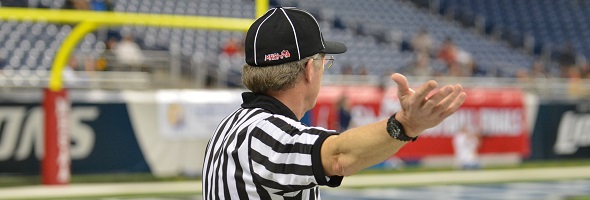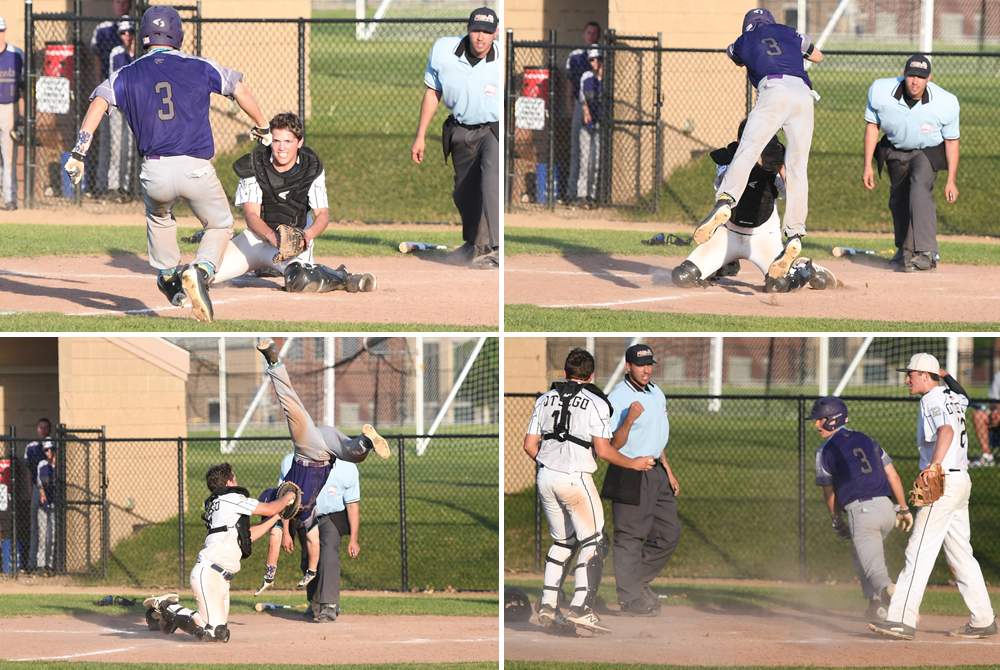
Be the Referee: Automatic 1st Downs
October 16, 2014
This week, MHSAA assistant director Mark Uyl explains the differences between high school and college and pro football when it comes to awarding automatic first downs.
"Be the Referee" is designed to help educate people on the rules of different sports, to help them better understand the art of officiating and to recruit officials. The segment can be heard on Mondays, Wednesdays and Fridays during the school year on The Drive With Jack Ebling on WVFN-AM, East Lansing.
Below is this week's segment - Automatic First Downs - Listen
Today we are going to talk about one of the biggest rule difference areas in high school football from those rules used in college and pro games and that deals with automatic first downs.
When watching that college game on Saturday or the pro game on Sunday, all of us know there are several defensive fouls that give the offense an automatic first down. However, under high school rules, the opposite is true most of the time.
The only high school fouls that result in an automatic first down for the offense are the roughing fouls - roughing the passer, the kicker, the holder and the long snapper. Fouls such as defensive pass interference or any other personal foul do not bring an automatic first down under high school rules.
Past editions
Oct. 8 - Officials & Injuries - Listen
Oct. 1 - Overtime - Listen
Sept. 25 - Field Goals - Listen
Sept. 18 - Tackle Box - Listen
Sept. 11 - Pass Interference - Listen
Aug. 25 - Targeting - Listen

Be the Referee: Avoiding the Tag
By
Paige Winne
MHSAA Marketing & Social Media Coordinator
May 14, 2024
Be The Referee is a series of short messages designed to help educate people on the rules of different sports, to help them better understand the art of officiating, and to recruit officials.
Below is this week's segment – Avoiding the Tag - Listen
We’re on the baseball diamond today where we’ve got a runner on second with one out.
The batter hits a ground ball that gets through the infield and the runner makes the turn at third, attempting to score. The throw comes in ahead of him, and as he nears home plate he dives head-first over the catcher, avoiding the tag, and touches home plate.
Is this legal?
It is not.
Runners are not required to slide. They can jump or hurdle a fielder if the fielder is lying on the ground. And they can jump over an outstretched arm attempting to make a tag. But diving over a fielder is illegal. The runner is out.
If no contact is made between the runner and fielder, the ball remains live, unless interference is called. If contact is made, the ball becomes dead.
Previous Editions
May 7: Baseball Pitch Count - Listen
April 30: Boys Lacrosse Helmets - Listen
April 23: Softball Interference - Listen
April 16: Soccer Red Card - Listen
April 9: Batted Baseball Hits Runner - Listen
March 12: Basketball Replay - Listen
March 5: Hockey Officials - Listen
Feb. 27: Less Than 5 - Listen
Feb. 20: Air Ball - Listen
Feb. 13: Hockey Penalties - Listen
Jan. 30: Wrestling Tiebreakers - Listen
Jan. 23: Wrestling Technology - Listen
Jan. 9: 3 Seconds - Listen
Dec. 19: Unsuspecting Hockey Hits - Listen
Dec. 12: No More One-And-Ones - Listen
Nov. 21: Football Finals Replay - Listen
Nov. 14: Volleyball Unplayable Areas - Listen
Nov. 7: Pass/Kick Off Crossbar - Listen
Oct. 31: Cross Country Interference - Listen
Oct. 24: Soccer Overtime - Listen
Oct. 17: Tennis Spin - Listen
Oct. 10: Blocked Kick - Listen
Oct. 3: Volleyball Double & Lift - Listen
Sept. 26: Registration Process - Listen
Sept. 20: Animal Interference - Listen
Sept. 13: Feet Rule on Soccer Throw-In - Listen
Sept. 6: Volleyball Jewelry - Listen
Aug. 30: Football Rules Similarities - Listen
Aug. 23: Football Rules Differences - Listen
(PHOTOS by Gary Shook.)

